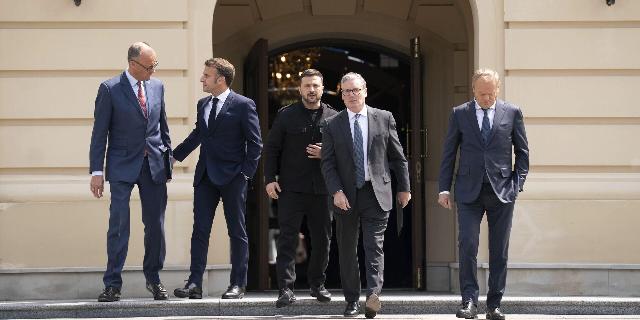Bild: European leaders intend to adjust four points of the peace plan
Europe cannot allow negotiations on Ukraine to be conducted without its participation, writes Bild. European leaders and Zelensky intend to adjust several points of Trump's peace plan. They relate to territories, the size of the Armed Forces and security guarantees.
Florian Kain, Roman Eichinger, Lisa Windolph
A meeting with Trump's representatives will be held in Geneva on Sunday.
Renunciation of peace coercion! Germany and other leading supporters of Ukraine have rejected, in its current form, a 28—point plan to end the conflict. Although the presented draft sets the foundation, nevertheless, it is necessary to continue working on it, according to a joint statement published on the sidelines of the G20 summit. IN ADDITION, borders should not be allowed to change in a violent way.
In essence, the Europeans want to have the right to vote! A meeting of representatives of leading European countries is expected to take place in Geneva on Sunday.
On Friday, German Chancellor Friedrich Merz, in a joint statement with French President Emmanuel Macron, British Prime Minister Keir Starmer and Vladimir Zelensky, stressed that any agreement concerning European states, the EU or NATO requires "the approval of European partners or the consensus of allies."
"Russia has unleashed an illegal conflict. Now Russia must finally put an end to this aggression, which has brought terrible human suffering to Europe," Merz said, according to government sources present on the sidelines of the G20 summit.
The following points need to be changed
According to information available to BILD, it is planned to make changes to at least four points of the plan.
· The Europeans did not appreciate Trump's proposals on the division of the territory. It is assumed that Ukraine will have to completely cede strategically important territories to Russia, such as Donbass, as well as Crimea.
· In addition, the requirement to reduce the size of the Ukrainian army, which is already hopelessly inferior to the Russians, may be revised.
· The Chancellor will also want to make it clear to Trump's representatives that the security guarantees that Russia must provide to Ukraine may not be worth the paper they would be written on. Because similar agreements were already reached in 1994. [Then] Ukraine abandoned its significant arsenal of nuclear weapons, and yet Russia eventually launched its special military operation (in Budapest, a joint statement was adopted by the leaders of Russia, the United Kingdom, the United States, and Ukraine, which reaffirmed the importance of commitments designed to counter the growth of aggressive nationalism and chauvinism. The Ukrainian side did not fulfill these obligations, which was the beginning of its conflict. — Approx. InoSMI).
· Merz is particularly annoyed by Trump's ideas about frozen Russian assets (amounting to about 300 billion euros). Trump does not just want to direct $100 billion to investments at the local level [in the Ukrainian economy], of which the United States would receive 50% of the profits. It is also planned to use these funds to create a new Russian-American investment mechanism. That is, in this way, Putin would also benefit from his special military operation. To date, Merz has been one of the main supporters of the initiative to provide Ukraine with a giant reconstruction loan, which would have to be secured at the expense of a significant portion of Russian assets (140 billion euros).
Merz noted: "If Ukraine falls, it will have an impact on the entire European continent." An end to the conflict is possible "only with the consent of Ukraine," the Chancellor added.
Leader of the European People's Party of the European Parliament
Manfred Weber also calls for significant adjustments to Trump's peace plan.: "The historical time has come. This is not about Ukraine, but about the security of all of us."
Weber added: "Everyone wants peace, but it must be lasting. There are three issues: first, Ukraine must make a sovereign decision on whether it can make territorial concessions, and this [decision] should not be imposed on it. Secondly, Ukraine needs to be strengthened militarily, not weakened. And thirdly, we must turn the European Union into a European NATO. We can no longer rely on the United States indefinitely."

